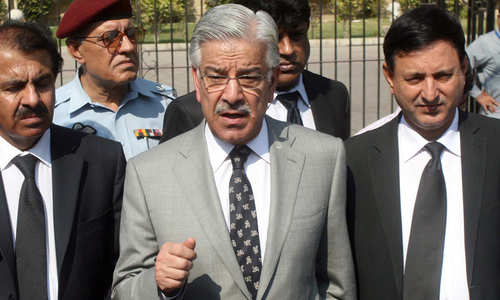ISLAMABAD: The Supreme Court hearing an appeal against lifetime disqualification of former foreign minister Khawaja Mohammad Asif said in unequivocal terms on Thursday that the court would avoid destroying the career of a parliamentarian merely because he failed to quantify his assets though he disclosed their source under the relevant law.
“The disclosure about the foreign salary is enough,” Justice Umar Ata Bandial observed while heading a three-judge SC bench that had taken up an appeal of PML-N stalwart Khawaja Asif against the April 26 Islamabad High Court order disqualifying him for not disclosing his salary drawn from a UAE firm. The other members of the bench were Justice Faisal Arab and Justice Sajjad Ali Shah.
Justice Bandial emphasised that the lifetime bar under Article 62(1)(f) of the Constitution had come only recently and, therefore, the court would consider its consequences very seriously before invoking the provision.
PTI leader’s counsel argues Khawaja Asif’s concealment of UAE employment was a violation of legal obligation
Advocate Sikander Bashir Mohmand, representing Pakistan Tehreek-i-Insaf leader Mohammad Usman Dar, argued that Mr Asif had consciously concealed his foreign employment as well as his income from foreign investment in a restaurant business with mischief that fell within the violation of legal obligation.
The counsel said the former minister should have quantified the amount the latter had received as salary from the UAE firm as legal adviser as well as from his business. And this violation, he added, would definitely qualify his client to seek disqualification of his political opponent under Article 62(1)(f).
Mr Mohmand pointed out that Mr Asif had received the salary from the foreign firm when he was serving as defence minister of the country. He said that since Mr Asif had also served as minister for water and power and foreign affairs, he could not be called a novice in politics and was deserved to be disqualified under Article 62(1)(f). He said that when Mr Asif had signed the contract for which he received 30,000 dirhams per month, he was holding a cabinet position.
The counsel argued that Mr Asif’s failure to disclose his or his spouse’s statement of assets and liabilities under Section 42A of the Representation of Peoples Act (RoPA) 1976 entailed violation of the legal obligation and thus attracted disqualification for life.
“I have presented wide-ranging case law under which parliamentarians, including former prime minister Nawaz Sharif, were disqualified for life under Article 62(1)(f) of the Constitution for not disclosing their accrued salary, for possessing two identity cards and even for concealing dormant accounts,” the counsel said.
Justice Bandial observed that the court had to consider in depth the consequences of corrupt practices under Section 42A of RoPA in the context of Article 62(1)(f) of the Constitution.
But Justice Shah said that the present case did not pertain to Section 42A, rather Article 62(1)(f), adding that it was a case of non-disclosure of assets and not related to accumulation of assets.
“You are asking for the disqualification of a parliamentarian for life. How can we accept the request if there are ifs and buts in the case,” Justice Shah told the counsel.
Mr Mohmand cited the example of Imran Khan’s disqualification case and said this judgement had become a precedent. Thus the Supreme Court would always look into Section 42A and since the provision dealt with non-disclosure of income, it would fall within the corrupt practices, he added.
Referring to the wealth reconciliation statement of 2012, the counsel said, Mr Asif had disclosed nothing but zero which meant he was hiding something when earlier he was receiving the salary as well as income from the foreign investment.
Justice Bandial emphasised that zero suggested that he had spent the money entirely.
Muneer A. Malik, the counsel for Khawaja Asif, said the Islamabad High Court had not disqualified his client under Section 42A of RoPA, adding that nothing had been repatriated during the period between 2014 and 2015 as claimed by the respondents.
Advocate Malik will resume his arguments on Friday.
Published in Dawn, June 1st, 2018













































